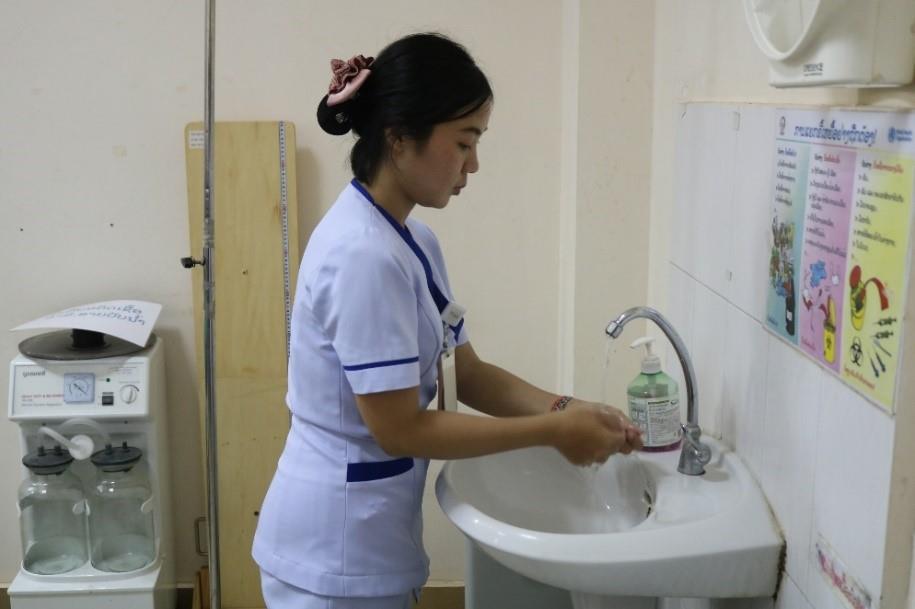 A nurse washes her hands after disposing infectious waste at the Children’s Hospital. Credit: WHO / S Khounpaseuth
A nurse washes her hands after disposing infectious waste at the Children’s Hospital. Credit: WHO / S KhounpaseuthIt is essential that hospitals are places that are safe for patients and their families to visit, and for health staff to work. Good infection prevention and control (IPC) is a fundamental part of this, not just during the COVID-19 pandemic but always.
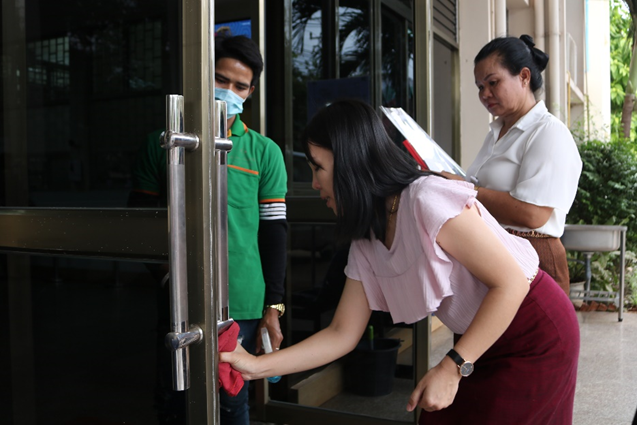 WHO staff Souvanaly Thammavong demonstrates proper cleaning of frequently touched surfaces to the hospital staff at the entrance of the Children’s Hospital.
WHO staff Souvanaly Thammavong demonstrates proper cleaning of frequently touched surfaces to the hospital staff at the entrance of the Children’s Hospital. Credit: WHO / S Khounpaseuth
Improvements of WASH and waste management activities
Even before the pandemic, WHO was working with the Ministry of Health’s Department of Hygiene and Health Promotion (DHHP) to improve water and sanitation (WASH), IPC and healthcare waste management at central and provincial hospitals. These investments have paid off, and we would like to share an example of the Children’s Hospital, which is viewed by many as a model for WASH and healthcare waste management.
The staff at the Children’s Hospital is often asked by MOH to share their experiences with other hospitals, on WASH, healthcare waste management and cleaning practices. Many of the staff understand the importance of regular handwashing, disinfection of common areas and frequently touched surfaces. Although the hospital has previously installed water tanks, handwashing stations, and waste disposal management, additional investments were made during the pandemic, with new water tanks and hand gel dispensers installed at the entrances to patients’ rooms for easy access.
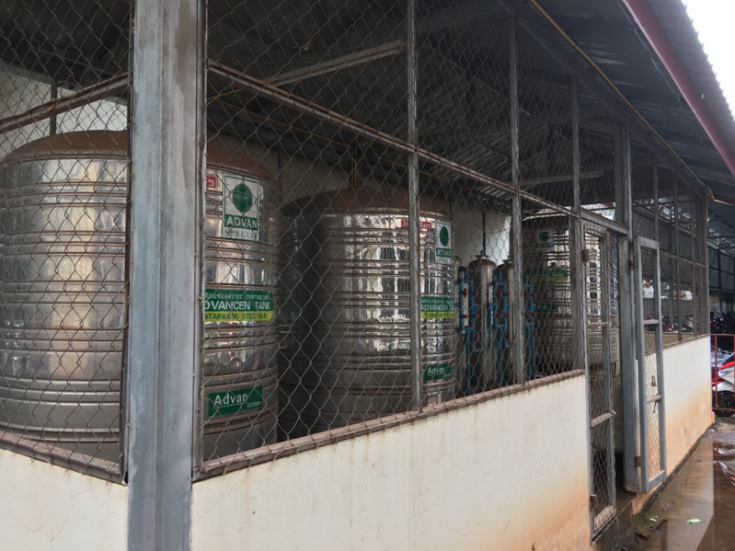 Water tanks were installed to ensure that the hospital staff have access to safe and clean water.
Water tanks were installed to ensure that the hospital staff have access to safe and clean water.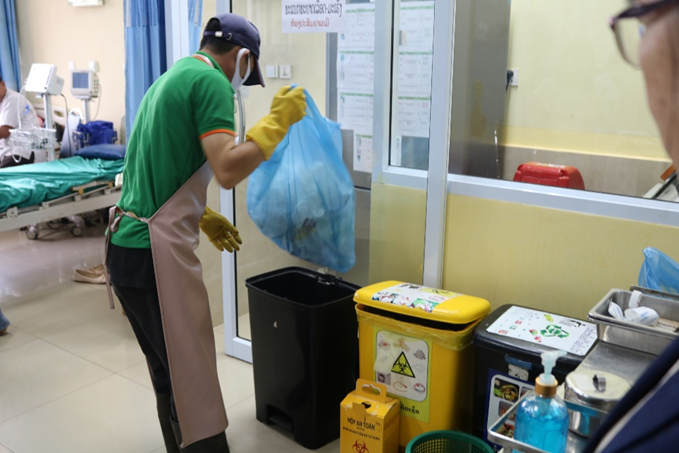 Hospital staff were taught to separate the infectious medical waste for proper management and disposal.
Hospital staff were taught to separate the infectious medical waste for proper management and disposal.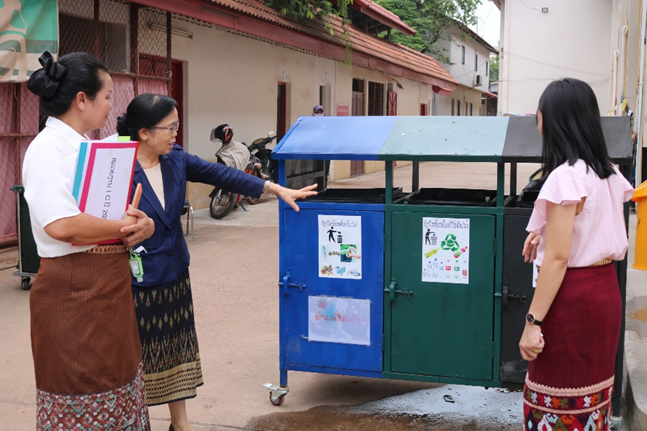 Deputy Director of the Children’s Hospital Dr Phonedavanh Donsavanh explaining about waste separation and recycling activities.
Deputy Director of the Children’s Hospital Dr Phonedavanh Donsavanh explaining about waste separation and recycling activities.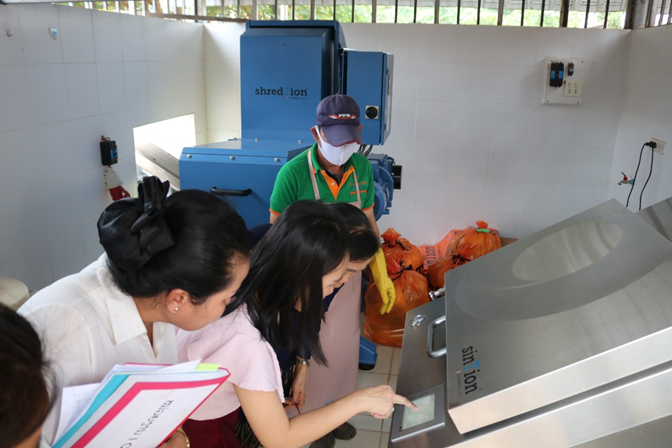 The WHO team regularly inspects the waste management system to ensure that it is functioning well.
The WHO team regularly inspects the waste management system to ensure that it is functioning well.Additional support during the COVID-19 pandemic
Coronavirus poses particular IPC challenges, and central and provincial staff at COVID-19 designated hospitals have been trained through simulation exercises on proper cleaning and disinfection of medical equipment, and wearing and safe removal of Personal Protection Equipment to reduce the risk of COVID-19 transmission in health facilities. The Ministry of Health, Department of Hygiene and Health Promotion (DHHP) also conducted several on-site trainings and supervision exercises in selected district hospitals.
To support the COVID-19 response, a general Infection Prevention and Control Guidelines document was updated in March 2020 and a Standard Operating Procedure was also developed for autoclave operation for treatment of infectious waste, environmental cleaning and disinfection.
When the WHO team first visited the Children’s Hospital, they learned that some of the health staff were initially worried about COVID-19 infection. However, they felt safer and more comfortable to provide treatment to patients after receiving trainings on infection prevention and control and getting up-to-date information on COVID-19 preventive measures.
Dr Phonedavanh Donsavanh, Deputy Director Children’s Hospital, stated that “We focused on WASH, IPC and waste management to protect our health staff and patients. We also received an important contribution from the Australian Government Department of Foreign Affairs and Trade (DFAT), which was facilitated by WHO. The hospital received 400 litres of alcohol 70% and 50 litres of sodium hypochlorite (cleaning and disinfection liquid). We will work with our staff to ensure that environmental surfaces are cleaned and disinfected regularly and properly.”
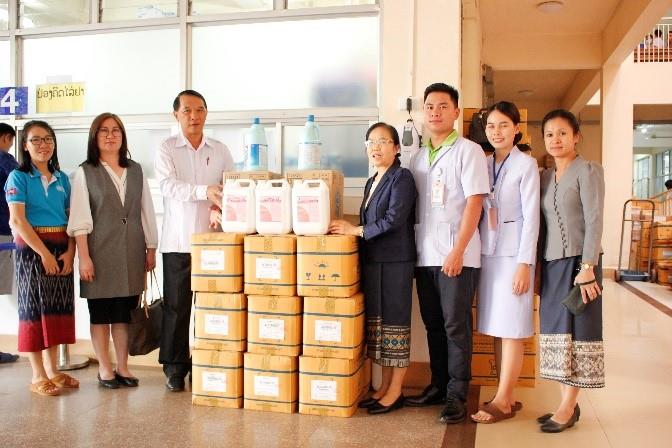 Dr Phonepaseuth Ounaphom, Director-General of Department of Hygiene and Health Promotion, hands over cleaning and disinfection solutions to Dr Phonedavanh Donsavanh, Deputy Director Children’s Hospital. Credit: CCEH
Dr Phonepaseuth Ounaphom, Director-General of Department of Hygiene and Health Promotion, hands over cleaning and disinfection solutions to Dr Phonedavanh Donsavanh, Deputy Director Children’s Hospital. Credit: CCEHWHO Representative to Lao People’s Democratic Republic, Dr Mark Jacobs said “To adequately address the challenges of IPC and build trust among patients and health workers, WHO will continue to coordinate with our partners and donors, on implementing simple and cost-effective measures like regular handwashing before caring for each patient, and cleaning and disinfection to reduce exposure to contaminated surfaces. Infection prevention and control is crucial during the pandemic, but strengthening done now will also provide benefits well into the future.”
